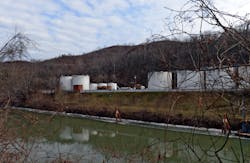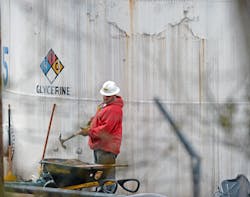U.S. Attorney Booth Goodwin on Dec. 17 announced that Freedom Industries Inc. (Freedom) and six former Freedom officials have been charged with various federal crimes related to the January 2014 Elk River chemical spill in Charleston that tainted drinking water for 300,000 people. Former company president Gary Southern faces 68 years in prison if convicted on all counts.
“Just a mile upstream from Charleston’s primary source of drinking water, the conditions at the Freedom Industries facility were not only grievously unacceptable, but unlawful,” said Attorney General Eric Holder. “They put an entire population needlessly at risk. As these actions make clear, such conduct cannot, and will not, be tolerated.”
Southern, 53, currently of Marco Island, Fla., along with former Freedom owners and officers Dennis P. Farrell, 58, of Charleston, William E. Tis, 60, of Verona, Pa., and Charles E. Herzing, 63, of McMurray, Pa., were indicted by a grand jury sitting at Beckley, W. Va. Freedom environmental consultant Robert J. Reynolds, 63, of Apex, N.C., and tank farm plant manager Michael E. Burdette, 60, of Dunbar, W. Va., were charged by Goodwin in documents known as “informations.” Freedom Industries Inc. also was charged in an information.
Southern is charged with the negligent discharge of a pollutant in violation of the Clean Water Act, negligent discharge of refuse matter in violation of the Refuse Act, and violating an environmental permit. Southern also is charged with bankruptcy fraud, mail fraud and wire fraud. If Southern is convicted of all the charges contained in the indictment, he is exposed to a statutory maximum of 68 years in prison.
Farrell, Tis and Herzing are charged with the negligent discharge of a pollutant in violation of the Clean Water Act, negligent discharge of refuse matter in violation of the Refuse Act, and violating an environmental permit. If Farrell, Tis and Herzing are convicted of all the charges in the indictment, they each face a statutory maximum of three years in prison.
Holder said he hoped the law enforcement actions “send an unambiguous message: that compliance with environmental safety standards is an obligation, not a choice.”
“It’s hard to overstate the disruption that results when 300,000 people suddenly lose clean water,” said Goodwin. “This is exactly the kind of scenario that the Clean Water Act is designed to prevent. This spill, which was completely preventable, happened to take place in this district, but it could have happened anywhere. If we don’t want it to happen again, we need to make it crystal clear that those who engage in the kind of criminal behavior that led to this crisis will be held accountable.”
The misconduct alleged in the indictment includes, but is not limited to:
- Failure to properly maintain the containment area surrounding the tanks at Freedom’s Elk River facility, and to make necessary repairs to ensure the containment area would contain a chemical spill;
- Failure to properly inspect a tank containing the chemical MCHM;
- Failure to develop and implement a spill prevention, control and countermeasures plan;
- Failure to develop and implement a stormwater pollution prevention plan and groundwater protection plan, both requirements of a National Pollutant Discharge Elimination System Permit.
During the time they were responsible corporate officers for Freedom, Farrell, Tis, Herzing and Southern allegedly approved funding only for those projects that would result in increased business revenue for Freedom, or that were immediately necessary for required equipment maintenance. They allegedly failed to take action to fund other repair and upkeep projects for equipment and systems necessary for environmental compliance at the Elk River facility, including repairing defects in a containment wall, addressing drainage problems in the containment area, and developing and implementing proper protection plans.
Information charges were also filed against Freedom itself, as well as Reynolds and Burdette. Freedom is charged with the negligent discharge of a pollutant in violation of the Clean Water Act, negligent discharge of refuse matter in violation of the Refuse Act and violating an environmental permit. Burdette, the former plant manager for the Freedom facility on the Elk River, and Reynolds, also one of the individuals responsible for environmental compliance at Freedom, have each been charged with violating the Clean Water Act.
Holder said that the Department of Justice is committed to vigorously enforcing the Clean Water Act and other natural resource protections. “And we will never rest in our efforts to protect the American people – and our environment – from harm,” he added.
Charges contained in indictments and informations are considered accusations, and defendants are presumed innocent unless proven guilty in a court of law.




